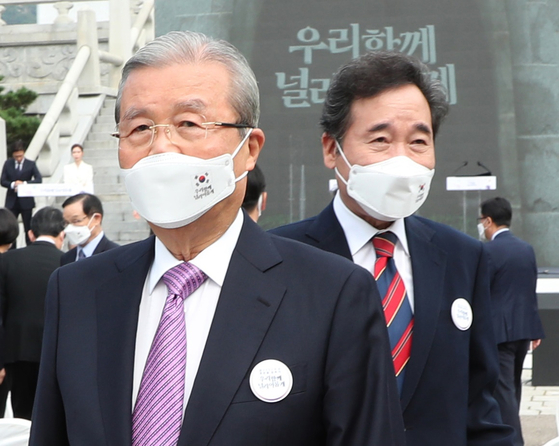![Nak-Yeon Lee (right) President of the Democratic Party and Kim Jong-in, Chairman of the People's Strength Emergency Response Committee. [뉴스1]](https://i0.wp.com/pds.joins.com/news/component/htmlphoto_mmdata/202101/08/3df19f90-b99f-4736-9738-f5efa4517cc3.jpg?w=560&ssl=1)
Nak-Yeon Lee (right) President of the Democratic Party and Kim Jong-in, Chairman of the People’s Strength Emergency Response Committee. [뉴스1]
It was investigated that public opinion that’the opposition party should win the election’ prevailed in the situation three months before the 4·7 re-election by-election.
According to the results of an opinion poll released on the 8th and polled by Gallup Korea on the 5th and 7th, 37% of the opinions that’a lot of ruling party candidates must be elected to support the current government’ regarding re-election and’to check the current government’ 52% answered that many opposition candidates should be elected. The reservation of opinion was 11%. In addition, the public opinion that wishes for the victory of the opposition including the power of the people rather than the Democratic Party was ahead of the margin of error (±3.1% points).
Opposition support in Seoul and Busan is stronger
In particular, such regime judgment theory was stronger in Seoul and Busan where the mayoral by-elections were held. In Seoul, 34% were elected to the ruling party and 58% were elected to the opposition party. In Busan, Ulsan, and Gyeongnam, 33% and 58% were respectively.
This flow of public opinion is quite different from last year’s 4·15 general election. In a survey conducted by Gallup Korea on April 13-14 last year, just before the general election voting, 49% said that’a lot of ruling party candidates must be elected to support the current government’, and’a lot of opposition party candidates must be elected to check the current government’ ‘Was 39%. Opinion reservation was 12%.
Public sentiment has changed in the opposite direction from just before the 4·15 general election
Although it was not a panel survey of the same subjects, support for the ruling party’s election fell 12 percentage points (49% → 37%), while the opposition party election support rose 13 percentage points (39% → 52%). In 9 months, the ruling and opposition parties’ jeonse completely reversed.
Seoul and Busan also showed similar patterns to the national trend. Compared to April of last year, in Seoul, support for the ruling party’s election fell 8 percentage points (42% → 34%), while the opposition party election support rose 13 percentage points (45% → 58%). In Busan, Ulsan, and Gyeongnam, the decline was 14 percentage points (47% → 33%) and 15 percentage points (43% → 58%), respectively.
President Moon’I’m doing it wrong’ all-time high
![President Moon Jae-in approval rate trend. [한국갤럽]](https://i0.wp.com/pds.joins.com/news/component/htmlphoto_mmdata/202101/08/f5974f94-d95a-4bcb-9856-9f7c9a47bd5a.jpg?w=560&ssl=1)
President Moon Jae-in approval rate trend. [한국갤럽]
In addition to the party support rate, the trend of passports is clear in the investigation of support for the administration of President Moon Jae-in. In a survey just before the general election in April of last year, 59% of the respondents said that President Moon was doing well (positive rate), but in the survey released on the 8th, it fell 21 percentage points to 38%. During the same period,’I’m doing wrong’ (the rate of injustice) rose 22 percentage points from 33% to 55%. The positive rate fell 2 percentage points compared to the previous survey, the lowest after taking office as in the second week of last month, and the negative rate rose 3 percentage points to the highest after taking office.
The decline in the approval rating of the passport was caused by various causes, including the soaring house price problem, the invisible Corona 19, the fight between Prosecutor General Yoon Seok-yeol and Justice Minister Choo Mi-ae, arising from the prosecution reform process, and economic instability. Among them, experts diagnose that the most important factor in the current election for the mayor of Seoul is the real estate situation. Heo Jin-jae, director of Gallup Korea, analyzed, “The public opinion that the opposition party should win in Seoul compared to Incheon and Gyeonggi even in the same metropolitan area means that the real estate issue was more important to Seoul citizens, who had a relatively large increase in house prices.” In fact, in this survey, 46% of Incheon and Gyeonggi had’opposition-elected support’ while that of Seoul reached 58%. Conversely, the’support for the ruling party’ was 41% and 34%, respectively.
People’s Party with Ahn Chul-soo
In the midst of this, the approval ratings of the Nationalist Party also rose with Ahn Cheol-soo, the representative of the National Assembly, who emerged as a prominent candidate for the mayor of Seoul. The vote of the People’s Party was 6%, the highest since its inception in February last year.
The survey reached 6273 voters over the age of 18 nationwide, with a final answer of 1000, recording a 16% response rate. The sample error is ±3.1% points with a 95% confidence level. For more information, please refer to the website of the Central Election Survey Deliberation Committee.
Reporter Heo Jin [email protected]
